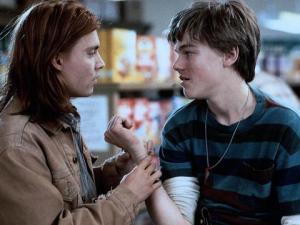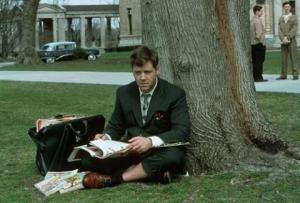Rating: 4/5
“We don’t really move. I mean, we’d like to, but… my mom is sort of attached to the house. Attached is, I guess, not the right word. She’s pretty much wedged in.”
It’s easy to forget, given his current preference for Tim Burton caricatures and eccentric pirate roles, that Johnny Depp can do more than act quirky. While he is undoubtedly enjoying his career – he’s said he’d be happy to play Jack Sparrow forever – it’s all becoming rather formulaic, and it’s such a shame. What was once unique and impressive is now unremarkable and, with upcoming film The Lone Ranger and a fifth Pirates of the Caribbean film in the pipeline, it’s all getting rather tedious. Quite frankly, it’s hard to watch What’s Eating Gilbert Grape? without at least a twinge of regret as to the progression of Depp’s acting career. As the title character, there’s not even the slightest hint of exaggeration; this is a nuanced, subtle performance, and remains one of his finest to date. It’s important to make that clear, because it could easily be forgotten when compared with that of Leonardo DiCaprio’s who, as Gilbert’s younger brother Arnie, utterly steals the show.
Before Romeo + Juliet and Titanic propelled DiCaprio into superstardom, he gained his first Oscar nomination for this role. The fact that he lost out to Tommy Lee Jones (The Fugitive) remains one of the worst decisions ever made by the Academy: his portrayal of a mentally handicapped teen is so entirely convincing that many people didn’t realise it was a performance. He is superb as Arnie, whose tics and twitches, shrieks and whoops never feel forced or over-emphasised. He is insufferable but harmless, infuriating and sympathetic, and every scene in which Depp and DiCaprio appear together (and there are many) is a joy to watch.
What’s Eating Gilbert Grape? starts and ends with a road stretching far into the horizon. It’s the entrance and exit to Endora, a dusty fictional town in America where Gilbert and his family live. Despite the vast open spaces and expansive sky, Gilbert is trapped in this sleepy hamlet, weighed down by his family responsibilities. He works at a local grocery store, which is slowly being put out of business by a new chain supermarket on the outskirts of town. He sleeps with an older, married woman. He cares for Arnie, and he lets curious children get a peek at his morbidly obese, housebound mother as a way of venting his own shame and frustration. Nothing ever changes and his life, and its accompanying burdens, seems inescapable because, crucially, Gilbert is a good person. It’s such a simple thing, but it’s the essence of the character. He can’t walk away, no matter how much he desperately wants to, because he loves his family, and they need him.
Gilbert’s mundane existence is suddenly challenged by the arrival of Becky (Juliette Lewis) and her grandmother, whose mobile home unexpectedly breaks down as they are passing through Endora. In Becky, Gilbert sees opportunity – she represents the rest of the world to him, with her free-thinking, worldly attitude and nomadic lifestyle. She’s the closest thing in the film to a cliché, but perhaps it’s necessary; her soulful philosophising and non-judgemental attitude may make her a bit saccharine, but she has to stand in contrast to the pleasant inertia of Endora and the unambitious contentment of the people in it. Gradually, Gilbert begins to acknowledge – if only to himself – that the road passing through his town could lead him out of it.
Based on a novel by Peter Heges, this is a delicate, understated, simple film filled with extraordinary performances. John C Reilly and Crispin Glover, in supporting roles as Gilbert’s likeable friends, are solid as always but, with the exception of the then unknown DiCaprio, the film’s biggest surprise is Darlene Cates as Momma. Discovered by Heges after an appearance on US talk show Sally Jessy Raphael, her weight and the real self-imposed imprisonment in her home, not to mention the ridicule and mockery she has been subjected to, are mirrored in the film. To describe Momma as a performance seems inaccurate: she embodies the role and all its complexities, presenting herself to the world and doing so with an admirable sense of self-awareness and dignity.
There are no villains in What’s Eating Gilbert Grape?; instead, the film is filled with a deep sense of humanity. The characters, their motivations, and the decisions they make, are all entirely believable and, while its plot could potentially veer into the melodramatic, Heges’ screenplay demonstrates a lightness of touch and some perfectly judged moments of humour. There is a simple beauty in the film also, as director Lasse Hallström brings Endora to life with cinematic shots of the impassive landscape and the huge skies above it. It’s a wonderful glimpse into small town American life that feels natural, delivered with sincerity and kindness.

